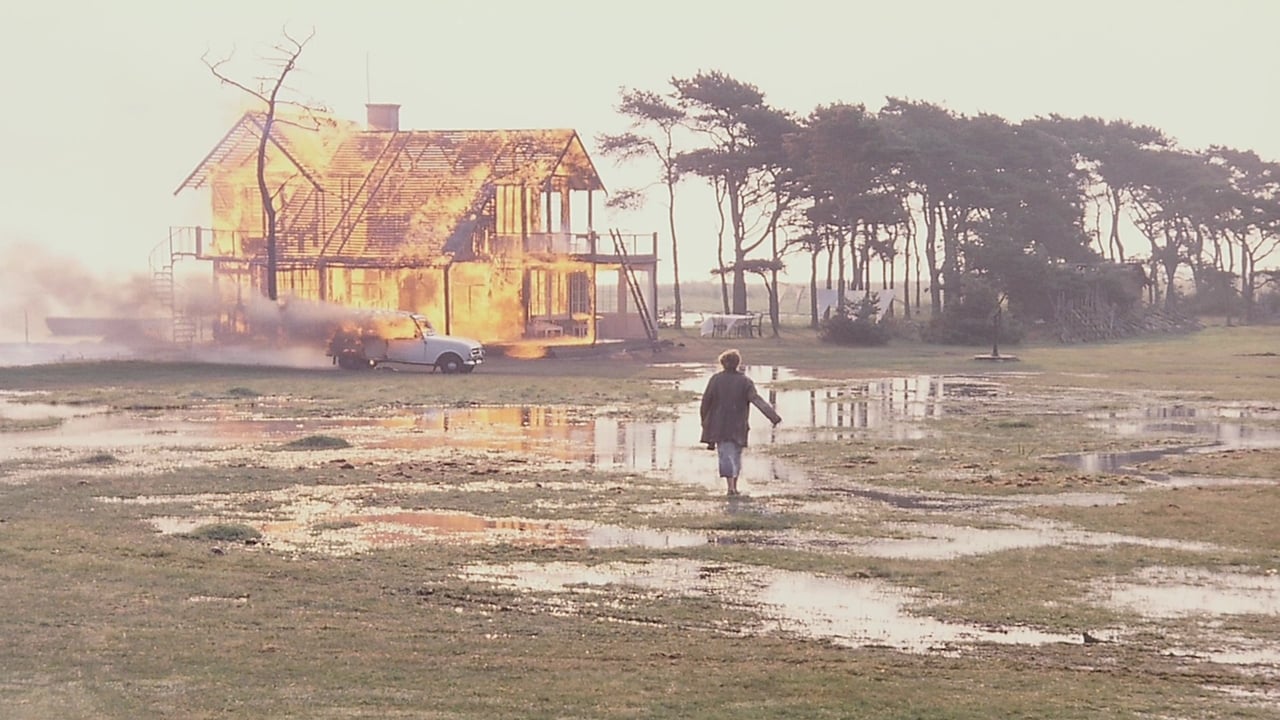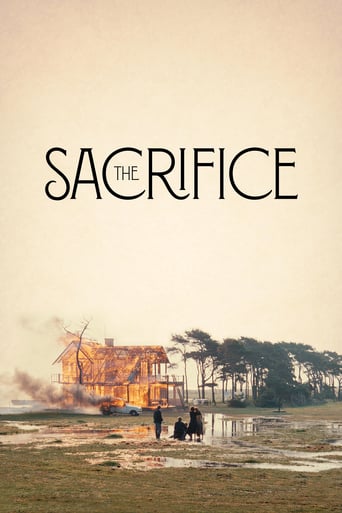

It was OK. I don't see why everyone loves it so much. It wasn't very smart or deep or well-directed.
... View Morean ambitious but ultimately ineffective debut endeavor.
... View MoreThe tone of this movie is interesting -- the stakes are both dramatic and high, but it's balanced with a lot of fun, tongue and cheek dialogue.
... View MoreStory: It's very simple but honestly that is fine.
... View MoreAt the dawn of World War III, a man (Bergman regular Erland Josephson) searches for a way to restore peace to the world and finds he must give something in return."The Sacrifice" was Tarkovsky's third film as a Soviet expatriate, after "Nostalghia" and the documentary "Voyage in Time", and was also his last, as he died shortly after its completion. Though his best-loved films were done in Russia, he clearly adapted well to Sweden, as films like "Sacrifice" are still powerful epics. He sort of entered the world of Ingmar Bergman by casting Josephson, using cinematographer Sven Nykvist, and even hiring son Daniel Bergman for the crew.Over the years, the film has grown in stature. In 1995, the Vatican compiled a list of 45 'great films', separated into the categories of "Religion", "Values", and "Art", to recognize the centennial of cinema. "The Sacrifice" was included under the first category, as well as Tarkovsky's "Andrei Rublev". This has helped "Sacrifice" reach more viewers who may know Tarkovsky for films like "Stalker".
... View More*some spoilers are included* After I've watched this for the first time, I was confused and not very happy. I liked the movie, but I expected it to be a total sacrifice movie because I was enchanted by Lars Von Trier movies and his work which is pretty cruel in my opinion ( and that's why I adore him) and then this movie gave me some kind of easy, light, kinda sleepy heavenly feel. It slowly introduced me to the world of the eternal beauty of nature, subtle philosophy teachings and the kindness of Alexander (I loved his personality all the time). It is not perfect because of the sacrifice itself, but of the glorious images which are also some very strong symbols. I adored the fire, it really touched me and I thought of some philosophy statements about the fire itself. If you want a total sacrifice I recommend "Breaking The Waves" (Lars Von Trier), but if you want an art treasure and nature yelling at your face, this is the great movie. I gave it 9/10 because the plot was little weak, maybe that is why I love this? I don't know, but this movie will have its hands on my mind for a long, long time.
... View MoreI have seen this movie only once, when I was nine or ten. I have never forgotten it and I still can see the perfect, emotionally wrenching scenes: The mother's hysterics after the announcement of the war, the wide-eyed hiss, "You must sleep with the witch!", the wicker chair catching in flames, the nude girl chasing chickens through a cool and silent house...There is a sort of grief in the movie's tone; the prolonged shots allow the viewer to feel as though they are standing there observing the events and not actually watching a movie.I am reminded of Ingmar Berman's 'The Seventh Seal', a movie which ranks along with 'The Sacrifice' as my top favorite. Both are terribly bittersweet and leave me feeling like I need to go to church.The whole of the film is incredibly beautiful. Watch it and remember it.
... View MoreSergei Tarkovsky has an unique cinematic diction: fragmented, complicated, anachronistic, with lengthy shots taken from static positions, long soliloquy, static frames with close resemblance of theatrical stage than a movie. He reminded me of Ingmar Bergman time and again while watching his movie ' Sacrifice', his last directional flick. Perhaps because the locale was Sweden, and the theatrical setting was reminiscent of Autumn Sonata: similar guilt complex, confessional monologues, predominant gloomy shades in shot compositions. The cinematic language is pretty dense, with layered allusions, switching between real and imaginary sequences. The movie starts with the Leonardo Da Vinci's painting Adoration of Magi used as a backdrop, on which the credit rolls, and then the camera pans along the tree stem of the palm tree to mix with the reflection of real foliages. As in Christian concept, the palm tree represents triumph over death and disaster, the movie unfolds the deadly tension of impending Nuclear Holocaust, and a barren tree planted by Alexandar symbolizes the mankind's hope for the triumph over the impending doom. Alexandar, in awe of this utter destruction, promises to sacrifice all his dearest possessions to the God. This is Tarkovsky's depiction of the inner self, truths hidden in apparently routine and mundane activities, expressed through a confessional narrative and studded with visions of the protagonist Alexandar. The visions may be mistaken as dreams, at least there are ample equivocal suggestions. But essentially the strong sense of impending doom, a nuclear holocaust, the fear for the posterity goaded the film maker...when an atheist prays for God's benevolence and eventually sacrifices his dearest mortal possessions to save the world.
... View More